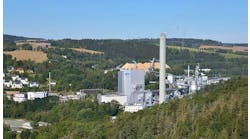Rockwell Automation's Integrated Architecture can be used to deliver optimization—not just for machines or processes, but for manufacturing cells, process areas and entire plants and even assist in enterprise wide optimization. So began Frank Kulasziewicz, vice president for control and visualization for Rockwell Automation, as he teed-up a wide-ranging panel discussion on the topic at this week's Manufacturing Perspectives press event at Automation Fair 2009 in Anaheim, Calif.
He pointed to four arenas in which sustainability is made possible by the company's Integrated Architecture offering: process, information, safety and OEM machine performance. He showed how Rockwell Automation's investments in core architecture are being leveraged into many different industries and verticals, as reflected in product offerings ranging from the company's PlantPAx process automation platform to its FactoryTalk VantagePoint visualization tool.
He showed that Rockwell Automation's acquisitions in the safety area have made them the number one provider of both discrete and process safety products and systems, and how integrated power and control has enormous implications for sustainability and energy savings. Plant-wide optimization, he continued, starts with design and commissioning and continues through operations, improvement and maintenance—the entire manufacturing life cycle.
Other panelists included Jeff Kent, technology section head for controls and information at Procter & Gamble, David Bynum, principal engineer from Coca-Cola North America, and Roddy Martin, senior vice president and research fellow at AMR Research.
"Who'd have thought ten years ago that the CEO of Rockwell Automation would give a speech about having an agile supply chain and actually have products to help make it happen?" Martin asked. "We're on the cusp of significant changes. We're going to see major advances in plant optimization, but it makes no sense to optimize a plant if we can't make it fit within the entire enterprise."
Martin said that functional fragmentation stands in the way of end-to-end collaboration and plant and enterprise optimization. He gave eight points which he said have to be addressed for true plant optimization to occur. First, optimization needs to be based on network demand and cash visibility. You have to have accurate demand forecasts, Martin said, as well as a reliable, compliant and predictable product supply network.
But that's not all, he added. You have to have a system of operationalized demand and innovation that takes into account profitable and balanced trade-offs across the network (supply chain). This must be coupled with the agility to profitably shape demand. In order to do this, Martin said, you have to be capable of managing complexity and leading organizational effectiveness.
GongKong's Sun agreed, saying that he believes that the convergence of control and information is here, and it will lead to a new concept—beyond productivity. The scope of control and information becomes the scope of business operations itself, he declared through an interpreter. "We no longer face technical issues—these are business issues." Plant-wide optimization, Sun said, is a response to the development of new business models and new levels of competition.
"Let me give you a Chinese example," he said. "Chery Automobile has 12,000 employees and makes 12 models from subcompacts to buses. In order to compete with their global peers, they knew they had to step up R&D and shift from ‘we sell what we have made' to ‘we make what the customers want to buy.' Chery implemented flexible production, product life-cycle management, virtual design, database management, business intelligence and MES. Now it takes three to four days to handle an engineering change order, rather than weeks as before. Product quality improved, time to market shortened. In 2004, they made 86,000 vehicles and were the ninth largest manufacturer of automobiles in China. By 2009, they were making 300,000 vehicles and had moved into the fourth spot in Chinese auto making. "I think," Sun concluded, "that it was the plant-wide optimization solution Chery implemented that made this magic happen."
David Bynum from Coca-Cola agreed. "We must have a demand-driven supply chain. We have only two or three dials that we try to tweak: efficiency, service and cost. But we have to remember that efficiency doesn't necessarily translate into bottom-line profit or top-line productivity gains. Sometimes we do projects to make production easier."
Bynum noted that the real problem is, "how do we promote information beyond its first consumer to the rest of the business, and how do we know what information we actually need?"
Kent, from Procter & Gamble, noted that his organization is struggling with this kind of reorganization and figuring out where responsibility lies for data management. Martin noted that Procter & Gamble isn't making cookie-cutter changes. Kent agreed, saying that how well this works depends on the role of manufacturing IT in the organization. "What the new Rockwell Automation products have meant to Procter & Gamble is that Rockwell Automation's sales people are now talking to a completely different customer in P&G, and they are serving as translators between IT and manufacturing sometimes."
Eisenbrown noted that technology organization is flattening because of the increasing importance of information and controls convergence.
Mr. Sun reviewed some challenges Chinese customers face in implementing plant-wide optimization. They need to understand what is "a pretty new concept," he said, and control engineering departments need to shift their view to business perspectives.
"There is also a cost issue," he said. "The convergence of information and control takes initial investment. Customers have to choose between an efficient system that has higher start-up costs, but lower total cost of ownership (TCO) and an inefficient system that doesn't cost as much to do at first, but where the TCO may be significantly higher." Chinese customers also have to learn how to choose vendors. They have too many choices, he said.
"China's government has just established a new government department whose name translates as ‘the department of industrial information and control' which is intended to manage the convergence of Ethernet, cell phone networks and the Internet," Sun said. "There is an undeniable trend to convergence," he concluded.
Bynum noted that in the old days, control engineers controlled equipment. "Now we're controlling processes. This sounds like a commercial, but the creation of the Logix platform was the starter for our plant-wide optimization efforts."
Kent said that it requires talent, systems, IT and managing all that information. Bynum responded that his number one impediment is budget, and the Automation Faith Dilemma: "How do we quantify the benefits of a project up front?"
The panel discussed simulation and modeling, and Kent noted that real power is in making comprehensive models that are automated and that just work. Martin said, "If you schedule variability, though, you don't get less variability, you get chaos."
"We're no longer thought of as the necessary evil," Kent said. Bynum also noted, "Rockwell Automation's reps now talk to IT directly—this never would have happened in the past."
Martin said, "One thing we grossly underestimate is change management, and as long as we do that, we won't have effective change. What do you stop doing? What do you start doing? What do you continue doing? If you don't know what you're doing, you can't control change."
The challenge of plant-wide optimization sometimes seems like the story of the seven blind men and the elephant. But information management will make it possible for everybody to see the same picture—all at the same time..




